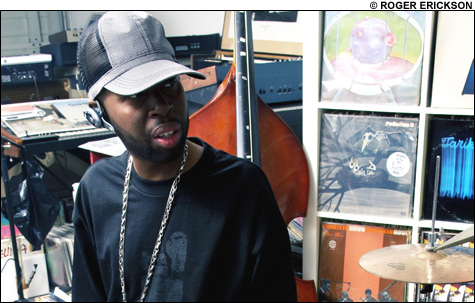
VISIONARY: Common called him “the John Coltrane of our time,” and there’s still plenty to learn about Dilla. |
As with so many other figures in pop music, death has been good to hip-hop producer and MC J Dilla (a/k/a Jay Dee, born James Yancey). Although he produced tracks for the Roots, Ghostface Killah, Common, and Busta Rhymes, he was never a household name. But when he succumbed to a combination of lupus and TTP in February 2006, it didn’t take long for the mythmaking to start — Common, for one, called him “the John Coltrane of our time.” Now Dilla’s posthumous releases have begun to arrive, but these are not the product of the same manic vault raiding that followed the deaths of Biggie and Tupac. In life, Dilla was a mysterious figure. There’s still plenty to learn about him.
Dilla’s 2006 album The Shining (BBE), with its sunny soul hooks laid over complex beat schemes, is a fair representation of his later sound. But the disc wasn’t complete at the time of his death, and it sounds unfinished, lacking Dilla’s usual coherence. A much fuller picture of the range of his talents emerges on the newly reissued 2003 EP Ruff Draft, which is stretched out over two discs with alternate mixes and instrumental-only versions by Stones Throw. Originally a limited edition vinyl-only release, Ruff Draft is the work of a very different Dilla from the one who produced The Shining or the similarly soul-soaked death-bed masterpiece Donuts (Stones Throw). The beats on Ruff Draft stomp on whatever lies in their path, and the layered, hazy production creates an uneasy, menacing climate. That Dilla spent his last days splicing together samples from his hospital bed is a good indicator of his obsessive approach; the experimental tracks on Ruff Draft are an enigmatic document of that obsession.
“Let’s Take It Back,” the disc’s opener, starts with a disorienting, cascading swirl of synth blips that float along for about 30 seconds before the drums and the bass kick in to anchor the track. Quintessential Dilla flourishes — a deep bell and some distorted yelling — are set way back in the mix, and like so many MCs who rapped over his beats, Dilla gets run over by his own production. He’s a workmanlike rapper with steady flow and intricate rhyme schemes; that said, I can’t remember a single line from Ruff Draft off the top of my head.
Which may be why there aren’t any rhymes on “Nothing like This”: they’d just be filler. With a drum that sounds like a basketball hitting the hardwood and guitars straight out of the Velvet Underground’s “What Goes On,” the song’s textured, impenetrable haze is Ruff Draft’s high point. Always one to mess with his listeners, Dilla occasionally stops the vocal loop in its tracks, revealing and sustaining some note between notes that would otherwise go unnoticed. If Ruff Draft is made for cars, this is the drunk-driving song.